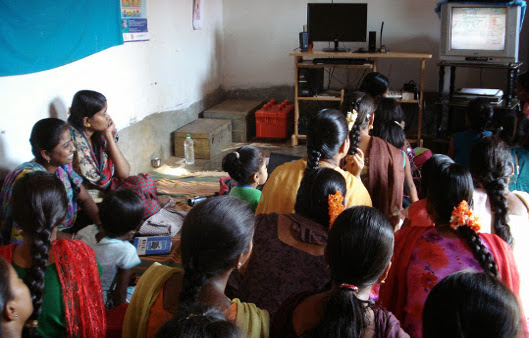The Women-gov project (2012-2014), a two-year multi-country action-research initiative supported by the International Development Research Centre, Canada, explored the question of how the guided use of digital technologies can strengthen marginalised women's informational, associational and communicative power in their engagement with formal and informal structures of local governance, across three sites in India, Brazil and South Africa. In particular, the project focused on studying context-appropriate techno-social models that can enable marginalised women in post-colonial democratic contexts in the global South, to effectively assert their citizenship. IT for Change has provided conceptual leadership to the project and in conjunction with its field centre Prakriye, steered the action-research at the India site. The Brazil research was spearheaded by Instituto Nupef; and that in South Africa by the University of the Western Cape.
At each of the three sites, the project developed a sustainable techno-social intervention model for enabling marginalised women's collectives to enhance their active engagement with governance structures and the collective articulation and negotiation of their interests; and build peer-to-peer networks for increasing their political participation. In short, exploring the conditions for women's active citizenship, a precondition for effective participatory governance, through digital technologies was the central concern of the project.
Project Outputs
Making Local Governance Work for Women: Exploring New Institutional Possibilities
This paper provides an interim overview of the project and briefly outlines the intervention strategies adopted by each of the three project sites: Brazil, India and South Africa, and the impacts of the same.
At the Interim Research Meeting that was held in Bengaluru in February 2014, the preliminary research analysis from each of the three sites of the project – Brazil, South Africa and India, was shared and discussed.
Baseline Study Framework
Between June-July 2012, a shared baseline study framework for the Brazil, India and South Africa sites of the Women-gov project was evolved in order to study the following aspects:
1. Nature of local governance systems, (formal and informal) institutions and local democracy
2. Nature of women's marginalisation at the community level; and
3. Access and use of digital technologies, and technology regimes
Monitoring & Evaluation Framework
In order to support the cycle of intervention-reflection- reflective intervention that is crucial to action-research, a Monitoring and Evaluation Framework was developed for the project in October 2013.
The Long March to We-gov: Insights from the Women-gov Action-Research Project in India
This research report highlights the main insights and key learnings, from the India research site. It explores how an alternative governance paradigm can be created for the network age – one in which the affordances1 of digital technologies are leveraged for building vibrant, local, institutional and democratic cultures, that further women's active citizenship, as substantive and transformational public-political participation.
Notes From Field
Some Reflections on our Information Centres Strategy
In this document, we discuss some of our experiences in the field, as part of the Women-gov action research project (Mysore, India). In specific, we reflect upon those conversations and experiences that raise some issues for reflection, around the information centres component of our project strategy.
To Break Down Doors or to Unlock Them?
Drawing upon conversations from the women of the Mahila Samakhya collectives who are part of the India Women-gov project, this note reflects on the need to examine the question of political subjectivity within and beyond conventional citizenship frameworks.
Some Reflections on Language, Voice and Political Action from the Yalodês Project
We understood, in the first months of the Yalodês project, that the most pressing need in terms of qualifying and improving black women's collective participation in local governance is to strengthen and amplify the women's voices, especially aiming for the better recognition of these leaders as legitimate political actors, improving the quality of their participation in the local governance structures and processes. This document details our reflections on strategies for amplifying women's political voice.
More details are available on the project microsite here.

